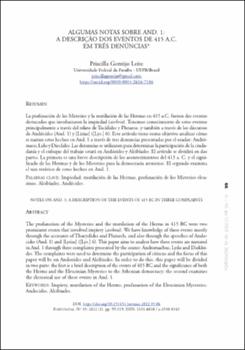Algumas notas sobre And. 1: a descrição dos eventos de 415 a.C. em três denúncias
Author
Leite, Priscilla GontijoDate
2022Abstract
La profanación de los Misterios y la mutilación de las Hermas en 415 a.C. fueron dos eventos
destacados que involucraron la impiedad (asebeia). Tenemos conocimiento de estos eventos
principalmente a través del relato de Tucídides y Plutarco, y también a través de los discursos
de Andócides (And. 1) y [Lisias] ([Lys.] 6). Este artículo tiene como objetivo analizar cómo
se narran estos hechos en And. 1 a través de tres denuncias presentadas por el orador: Andrómaco, Lido y Dioclides. Las denuncias se utilizaron para determinar la participación de la ciudadanía y el enfoque del trabajo estará en Andócides y Alcibíades. El artículo se dividirá en dos
partes. La primera es una breve descripción de los acontecimientos del 415 a. C. y el significado de las Hermas y de los Misterios para la democracia ateniense. El segundo examina
el uso retórico de estos hechos en And. 1. The profanation of the Mysteries and the mutilation of the Herms in 415 BC were two
prominent events that involved impiety (asebeia). We have knowledge of these events mostly
through the accounts of Thucydides and Plutarch, and also through the speeches of Ando-
cides (And. 1) and [Lysias] ([Lys.] 6). This paper aims to analyse how these events are narrated
in And. 1 through three complaints presented by the orator: Andromachus, Lydo and Dioklei-
des. The complaints were used to determine the participation of citizens and the focus of this
paper will be on Andocides and Alcibiades. In order to do this, this paper will be divided
in two parts: the first is a brief description of the events of 415 BC and the significance of both
the Herms and the Eleusinian Mysteries to the Athenian democracy; the second examines
the rhetorical use of these events in And. 1.





